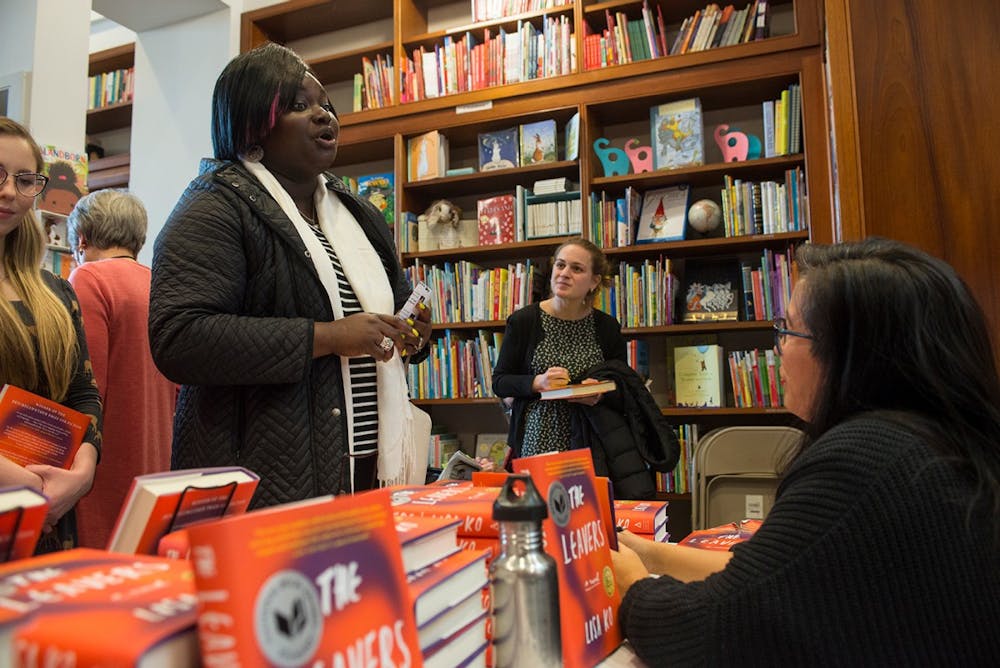A book is not inert, at least not to Kalela Williams — writer, arts administrator and director of Virginia Center for the Book. She believes humanity is found in both our ability and our drive to produce these artistic objects.
“We need books, maybe more than we ever have,” Williams said.
Williams’s organization reflects this understanding of books as urgent. Virginia Center for the Book operates out of the Jefferson School City Center in Charlottesville and boosts books, reading and writing by offering workshops, literacy resources and accessible literary events. As a part of Virginia Humanities — a state humanities council founded by Congress and receiving support from the National Endowment for the Humanities — and an affiliate of the Center for the Book in the Library of Congress, the Virginia Center for the Book is linked to both local and national literacy efforts.
Williams became director of the center in Oct. 2022. She noted a need for multifaceted approaches to literary objectives based on her professional background.
“I've done a lot of public programming,” Williams said. “Many of [these programs] were literary in nature, but they were also interdisciplinary. That was something that I really learned from that I want to bring here to the Center for the Book.”
The organization connects the state’s populations of writers, readers and artists of other types through the medium of the book, and its activities can be divided into three key parts — its Book Arts program, a series of year-round literary programs and its annual Virginia Festival of the Book.
Virginia Center for the Book grants member artists in the Book Arts program access to the largest collection of letterpress type and equipment in the state. Members practice book arts — papermaking, letterpress printing and binding — in the Center’s workshop space in the Jefferson School and offer courses to non-members interested in getting involved in these disciplines.
“Many of our members are working artists,” Williams said. “Some of them exhibit in museums or other collections.”
She noted Book Arts member Lyall Harris, who helped curate a showcase of artists’ books by women for Randolph College’s 112th Annual Exhibition of Contemporary Art.
As for year-round literary programming, Virginia Center for the Book offers exhibitions and events in collaboration with artists and writers on an ongoing basis. Historian Edward Ayers will give a talk on his recently released book, “American Visions: The United States 1800-1860,” Nov. 16. The event is free and open to the public.
The Center also recently hosted a fundraising Book Bash involving readings, Book Arts classes and auctions for lunches with Virginia authors Henry Hoke and Rachel Beanland. This event, dubbed Reads & Reveals, helps to support the Book Arts program and the upcoming Virginia Festival of the Book.
Getting people excited about books through this programming represents one major part of the Center’s purpose. Williams said she sometimes worries about the dispiriting effects of rhetoric surrounding the “death of the humanities” which pops up in popular media.
“Every day, it seems, there's an article about the humanities becoming more and more irrelevant, but I fundamentally disagree,” Williams said. “Books tell stories, and storytelling is part of who we are as human beings.”
The issue of restriction is often on Williams’s mind too.
“I believe in books being in hands that want them,” Williams said. “I'm not thrilled personally about someone telling someone else what they can and can't read…That's a moral issue to me. But it hasn't challenged the work that I do, it hasn't made the work that I do more difficult yet, and I hope that it never does.”
Despite these obstacles, Williams noted the organization’s inclusivity and accessibility.
“We are here for readers and writers, but we're also here for non-readers and non-writers, because at the end of the day, everybody is one of those things,” Williams said. “We are here for everybody, and books are here for everybody. That's who we are, and that's what we need.”
Now, the Virginia Center for the Book team is in the early stages of setting up the 2024 Festival of the Book, an annual event and one of Virginia Humanities’ flagship programs.
Next year’s festival is coming up March 20 to March 24 in Charlottesville and will be preceded by a series of preview events across the state throughout the month. Names of headliner writers will be released soon, and information on events can be found on the Virginia Festival of the Book website.
The festival may be the organization’s biggest undertaking, but it is only one of the Virginia Center for the Book’s many effective methods of empowering readers and writers. Reflecting on the Center’s activities, Williams reiterated the ongoing relevance of books as a means of connection.
“Books allow us to talk to one another, they allow us to talk to ourselves, they allow us to find out things about ourselves,” Williams said. “The underpinning service we provide is to bring communities across the state together and to bring us closer to ourselves.”
Follow Virginia Center for the Book on social media to stay updated.







